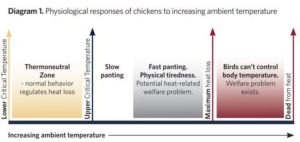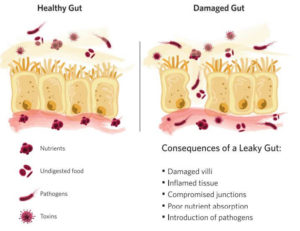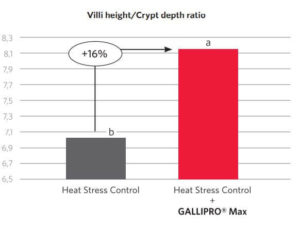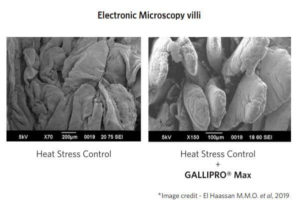
31 May Coping with the seasons: Summer Heat Stress What GALLIPRO® Max can do for your birds
Heat stress is a severe and costly problem for the poultry industry. When poultry are exposed to elevated temperatures and high humidity, they experience stress, resulting in a depression of performance efficiency. The extent of stress is determined by the body temperature. The body temperature of broilers is close to 106°F. However, if their temperature rises more than 7°F above this, birds will start to die. Birds are “heat stressed” when they have difficulty achieving a balance between body heat production and body heat loss. This can occur at all ages and in all types of poultry. When the external temperature exceeds the “upper critical temperature”, birds start panting to actively lose heat. Panting is a normal reaction to heat and is not considered a welfare problem. But as the temperature increases, panting may not be sufficient to maintain normal body temperature. If heat production becomes too intense (acute heat stress) or too long (chronic heat stress), birds may die. Poultry begin to experience heat stress with fast panting. Reduced feed intake, growth rate or laying rate and potential mortality occur when the birds are no longer able to cope with an elevated internal temperature. While birds experiencing heat stress will have reduced feed intake, this reduction in energy and protein intake does not by itself explain the loss in meat or egg production. This is because a stressed immune system will use energy, thereby further reducing the energy available for production.

Heat stress causes $128-$165 million of loss per year to the US poultry industry, in addition to being a severe well-being issue as well.
Heat Stress and the Immune System When birds experience heat stress, a cascade of metabolic events occur.
- Increased body temperatures result in increased panting and less nutrient consumption
- Blood pH will become elevated (alkalosis), resulting in decreased calcium availability and subsequent lameness
- Intestinal tissue becomes weak and inflamed, resulting in “leaky gut”. Thus, the intestinal barrier function is reduced or compromised
- Nutrient absorption across the intestine decreases and the passage of harmful antigens, like lipopolysaccharides (LPS) into the blood increases, activating the immune system

How to limit the impact of heat stress?
- Reduce bird density
- Increase air movement with additional fans
- Stimulate water intake (by adding electrolytes such as potassium chlorate, sodium bicarbonate)
- Reduce or stop feed intake 4-6 hours before the daily peak of heat
- Use of evaporative cooling or fogging systems in the barns prior to, and during the peak, of heat
What GALLIPRO® Max (Bacillus subtilis) can do for your birds: Recent research conducted with GALLIPRO® Max at the dose of 8.0 x 105 cfu/g of feed at University of Delaware demonstrated that Bacillus-based products can help maintain the absorptive surface of the intestine, limit the impact of reduced feed intake, and decrease mortality.
Possible explanations for this effect may include:
- Protection of the epithelium by coating the surface of the intestine
- Preservation of villi integrity
- Beneficial support of intestinal surface absorption
- Improved feed utilization – Chemicals signaling between gut and
certain areas of the brain that regulate behavior during heat stress
(Wang, 2018)


Before and during the hot season, the use of an effective probiotic such as GALLIPRO® Max will help to protect the epithelium of the intestine and thus limit the impact of high temperatures by reducing leaky gut; thereby minimizing health and financial losses associated with heat stress




Sorry, the comment form is closed at this time.